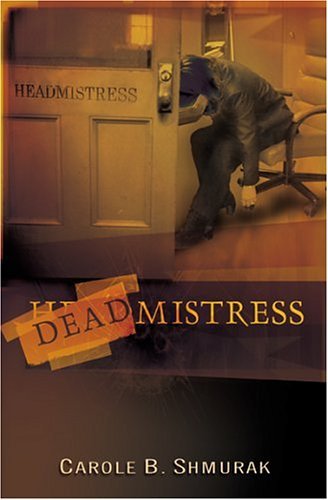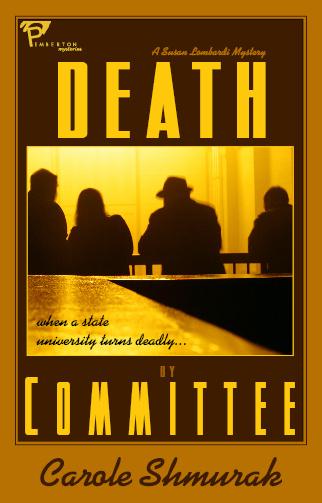|
AN INTERVIEW WITH CAROLE SHMURAK -
conducted by Steve Lewis
Rather than my writing another introduction here, what you should do instead is to go read my review of Carole’s first mystery novel, Deadmistress. That’s where I describe how we both taught at the same university for (cough, cough) number of years, and our paths never crossed until we were both semi-retired. Then come back (please) and listen in on the conversation below that she and I had by email in late October, 2005.  Q. How long you been reading mysteries? Have your reading tastes changed over the years? CS. I’ve been a devoted fan since 1968, when I discovered Dorothy L. Sayers (as a result of reading Carolyn Heilbrun’s essay “Dorothy Sayers, Lord Peter and God”). After I read all of Sayers’s novels, I started reading her essays on detective fiction, which took me to books like Bentley’s Trent’s Last Case and other older mysteries. (My ‘nom’ on DorothyL is Mabel Manderson, who is the woman in Trent’s Last Case.) Then I worked my way through Margery Allingham, Josephine Tey, and Michael Innes. I still love those books. When the women detectives, like Kinsey Milhone and Carlotta Carlisle, started appearing in the 1980s, I began reading more American books, first the female but then the male writers. I just finished reading the entire 87th Precinct series. Ed McBain was a big hero of mine. Q. Yes, then I was right. After I read your first book, Deadmistress, I could tell that you liked the “old-fashioned” detective stories, the older ones that almost always came with a map and/or a cast of characters. Of the older authors, who are your favorites today? CS. Oh, yes. That’s exactly why Deadmistress has both a map and cast of characters. I guess I’d add Edmund Crispin to the list of favorites that I mentioned in the first question. I also love Robert Barnard, Peter Lovesey and Peter Dickinson. Can you tell I like a bit of humor with my mystery? Q. Who had a stronger influence on your life, Nancy Drew or Miss Marple? Q. Do you think that current mysteries are (generally speaking) weaker on plot than they should be, or so that you don’t think this is a leading question, are current mysteries just as good if not better when it comes to clues and “playing fair” with the reader? CS. I think there is less emphasis on playing fair and more on character these days. Doesn’t make them weaker, just different. Q. Should we conclude that Susan Lombardi, the sleuth in Deadmistress, is based on you, or on anyone you know? Have you ever wished to be able to solve a murder mystery yourself? CS. Of course, Susan is based on my life – she has the same professional background and my insatiable curiosity. Fortunately, I’ve never been close to anyone who’s been murdered, and am happy solving puzzles in books. But everyone wants to know if Swash is based on my husband! He’s not. He’s my ideal husband: he’s independently wealthy and he cooks! My real husband, Steve, is a wonderful person but he lacks those two traits, and he does leave the house, at least 3 days a week to go to his office. Q. You went with a small independent publisher, SterlingHouse, to put out your book. Are you satisfied with how you’ve done with them? How did you choose them? What advantages are there in working with a smaller publisher? CS. With my first YA book, I went the agent route, and was told by several YA agents that the book wasn’t commercial enough, so I tried several small presses and finally found one that loved the book and asked me to turn it into a series. With Deadmistress, I had an “in” with one of the NY publishers; it sat unread on the desk of a big-name editor for 6 months, until she finally looked at it, said “it’s well-written but we already have a professor series” and sent it back. So I thought, “I’m not getting any younger” and sent it out to a bunch of small presses. Sterling House was the one that wanted it. They’ve done well by me, featuring the book at their booth at BookExpo in NYC and promoting it as one of their “hottest books” on their website. The advantages are the very personal attention one receives. Q. Deadmistress is now the first in a series, with the second Susan Lombardi book coming out soon. Susan is now a college professor and working toward tenure. Is the academic setting eventually going to restrict how many books there can be? How many mysteries can she realistically find herself involved in?  CS. Book Two, Death by Committee,
takes place entirely at the university, a very different venue from the
elite private school of Deadmistress.
Book Three, which I’ve just
begun, takes place
at a large public high school in an extremely affluent
suburb. If
there’s a Book Four, it
will be set at a large convention of educational researchers.
But it doesn’t have to be
an academic setting. Book Five could be Susan and
Swash on a vacation out West or in the Virgin Islands. The fun is
having
the characters continue from book to book and having them grow – Swash
actually leaves the house in Book Two and gets out even more in Book
Three –
and
bringing back characters from previous books in new ones. In Book
Two, Elaine,
Susan’s
best friend and frequent dinner companion,
gets a very suspicious boyfriend; and in Book
Three, Shauna, the African-American
girl from Deadmistress, has
graduated from Yale and is the only black teacher
in an all-white high school. CS. Book Two, Death by Committee,
takes place entirely at the university, a very different venue from the
elite private school of Deadmistress.
Book Three, which I’ve just
begun, takes place
at a large public high school in an extremely affluent
suburb. If
there’s a Book Four, it
will be set at a large convention of educational researchers.
But it doesn’t have to be
an academic setting. Book Five could be Susan and
Swash on a vacation out West or in the Virgin Islands. The fun is
having
the characters continue from book to book and having them grow – Swash
actually leaves the house in Book Two and gets out even more in Book
Three –
and
bringing back characters from previous books in new ones. In Book
Two, Elaine,
Susan’s
best friend and frequent dinner companion,
gets a very suspicious boyfriend; and in Book
Three, Shauna, the African-American
girl from Deadmistress, has
graduated from Yale and is the only black teacher
in an all-white high school. Q. How many books have you planned ahead? Have you considered creating another series, or is just the one taking up the time you have to write them? CS. As you can see, I’m well into Book Three and thinking about Book Four. I have an idea for another historical series – I’m not sure whether it will be YA like my Matty Trescott historical series or adult like Deadmistress. Q. If the Susan Lombardi series were to be picked up by TV or the movies, who would you suggest would be the ideal person to play her? Her husband, Michael “Swash” Buckler? Her student and former PI, Mark Goldin, who helps her in her sleuthing efforts? CS. Wow! I just had a lot of fun trying to cast this. I think I am assuming TV here, since I didn’t come up with any actors who would be big Hollywood box office. Susan: must be ethnic: Mary Elizabeth Mastrantonio (saw her last on Broadway in Man of La Mancha) or Annabella Sciorra (she’s on Law and Order: Criminal Intent now). Swash: David Strathairn (now playing Edward Murrow on the big screen). Elaine: Geena Davis (when she gets tired of being president of the US). Mark: Rob Morrow (formerly of Northern Exposure, now on Numb3rs). Q. I think you’re a pretty good casting director! You are also involved with reading groups devoted to mysteries at various libraries, are you not? What authors do you discuss? Who do you see as the popular authors today? CS. I founded and am a member of a group at my local library, and I lead a second group at another library. For the first, the entire group picks the books for the year, and our choices have been all over the board: Dennis Lehane, Colin Dexter, Lawrence Block, Sue Grafton; the favorite authors so far are P.D. James, Dorothy Sayers, Walter Moseley, and Josephine Tey. (Isn’t it funny to see Moseley in there? But he’s great.) For the second group, I pick the books for certain themes. So we have read murders set in Italy (Magdalen Nabb, Donna Leon, Iain Pears, Michael Dibdin) and murders set to music (Sharyn McCrumb, Kate Ross, Lucille Kallen, Cynthia Harrod-Eagles), and urban PIs and police procedurals. That group is a little less patient with the older writers so we tend to read books from the 1980s to the present day. I don't think about what’s “popular.” I just want them to be well-written and fun to read. Q. Would you agree with the statement that interest in mystery fiction is at an all-time high? What do you think the reason for it is? Q. Do you believe that mystery and detective fiction has a greater purpose, or it should be designed for entertainment only? Can mystery fiction also be literature? CS. I read for the entertainment. Of course it can have a greater purpose as long as it doesn’t get preachy. Sharyn McCrumb and Gillian Roberts have done this well, as has Walter Moseley. Who defines what is “literature”? Most English departments have moved away from the canon, so well-written fiction of any kind can be considered literature. Books like The Maltese Falcon and The Nine Tailors (or Gaudy Night) are taught in lit classes these days. Maybe books have to be 70 years old to be taken seriously. Q. What directions do you think the mystery genre is heading? Is this a good trend, as far as you are concerned, or bad? CS. No idea! Many directions, I’d say.  Q. Returning to
your own
books, and I suppose you are asked this often, where do you come up
with your ideas? Other than the murders, is what happens in your
books based on
incidents that happened, or on people that you’ve known in academic
settings
over the years? Q. Returning to
your own
books, and I suppose you are asked this often, where do you come up
with your ideas? Other than the murders, is what happens in your
books based on
incidents that happened, or on people that you’ve known in academic
settings
over the years? CS. All sorts of places. Death by Committee was sparked by a Chronicle of Higher Education article about a tenure case. Then I superimposed upon that some incidents that had occurred at CCSU, and added one event from my family. Deadmistress had a lot of characters who were composites of people I knew in my prep school teaching days. Then I just asked myself how they would react if the headmistress of the school had been murdered. Q. One final question. How do you like being retired? CS. I love it! I’m very busy but never tired. When I worked full-time – I still teach one course a semester – I was always so exhausted at the end of the day. Now my energy level is much much higher. Q. Then we certainly agree on that point! And on many others as well. Thanks for taking the time to talk with us. _____________________________________ YOUR COMMENTS ARE WELCOME. stevelewis62 (at) cox.net
Copyright © 2005 by Steve
Lewis. All rights reserved to contributors.
Return to
the Main Page.
|